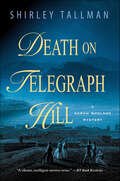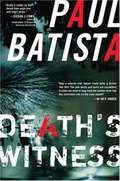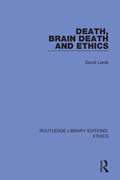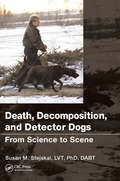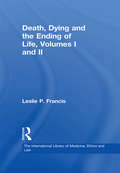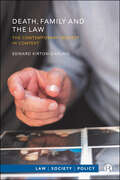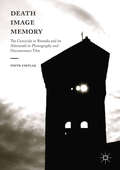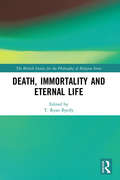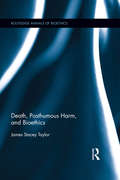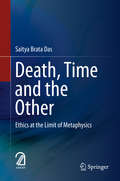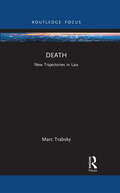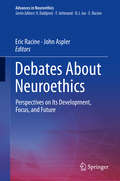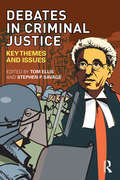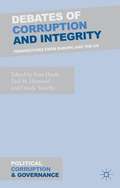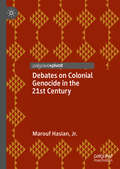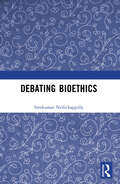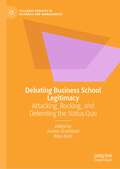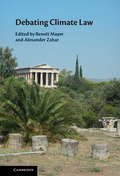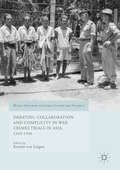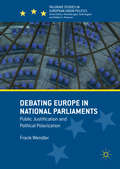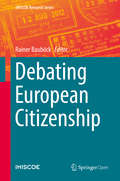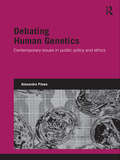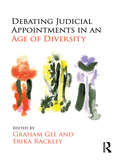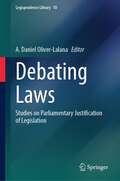- Table View
- List View
Death on Telegraph Hill: A Sarah Woolson Mystery (Sarah Woolson Mysteries #5)
by Shirley TallmanA female lawyer in nineteenth-century San Francisco investigates her brother’s shooting in this “excellent” mystery with “a dogged and fearless sleuth” (Publishers Weekly, starred review).San Francisco, 1882. crusading lawyer Sarah Woolson and her brother, Samuel, have just had a delightful time meeting the young Oscar Wilde at a friend’s home on Telegraph Hill. But as they make their way home, a bullet pierces the fog, striking Samuel. Who could want to hurt such a delicate soul? Was he even the intended target? Determined to find answers, Sarah discovers more murder and mayhem on Telegraph Hill.With Death on Telegraph Hill, Shirley Tallman delivers an exciting whodunit with a trailblazing heroine in a time and place when a nice young woman was supposed to be found in the drawing room instead of the courtroom.
Death's Witness
by Paul BatistaTom Perini, legendary Heisman Trophy winner turned successful criminal lawyer, has just entered Central Park for his evening run. The light from the setting sun washes over his face as Perini enters the no-man's land where Harlem and East Harlem join at an invisible seam. Within minutes Tom Perini's life turns into a mystery--with murder at its heart. * Paul Batista, one of the country's foremost defense lawyers, has written a tale of killers and criminals so devious, and a courtroom drama of corruption and greed so authentic, it reads like tomorrow's headlines. Enter a venomous world populated by an imperial drug lord addicted to poetry, a killer who slithers through the city with total anonymity, and a beloved but hopelessly corrupt Congressman--all of whom have to watch their backs when one of the world's great criminal lawyers finds himself involved in ways he never dreamed could happen. As the crimes mount and the betrayals hit closer to home, he will have to find the means to protect himself and the woman he loves before they become Death's Witness.
Death, Brain Death and Ethics
by David LambOriginally published in 1985, this book examines the concept of death against the background of dramatic changes in medical technology. The book argues that ‘brain death’ can be precisely defined and that a biological concept of death such as ‘brain death’ can be philosophically well-grounded. It examines traditional criteria for death and various formulations of the concept of death in both medical literature and philosophical texts. Definitions of ‘brain death’ – some of which have become statute law – are critically examined. The author also examines ethical and social policy questions which arise out of attempts to redefine the boundaries of life.
Death, Decomposition, and Detector Dogs: From Science to Scene
by Susan M. StejskalDeath, Decomposition, and Detector Dogs: From Science to Scene is designed to help police investigators and Human Remains Detection K9 handlers understand the basics of forensic taphonomy (decomposition) and how to most effectively use a human remains detection (HRD) K9 as a locating tool. The book covers basic anatomy and the physiology of canine
Death, Dying and the Ending of Life, Volumes I and II (The International Library of Medicine, Ethics and Law)
by Leslie P. FrancisThe two volumes of Death, Dying, and the Ending of Life present the core of recent philosophical work on end-of-life issues. Volume I examines issues in death and consent: the nature of death, brain death and the uses of the dead and decision-making at the end of life, including the use of advance directives and decision-making about the continuation, discontinuation, or futility of treatment for competent and incompetent patients and children. Volume II, on justice and hastening death, examines whether there is a difference between killing and letting die, issues about physician-assisted suicide and euthanasia and questions about distributive justice and decisions about life and death.
Death, Family and the Law: The Contemporary Inquest in Context (Law, Society, Policy)
by Edward Kirton-DarlingWhen a death is investigated by a coroner, what is the place of the family in that process? This accessibly written book draws together empirical, theoretical and historical perspectives to develop a rich, nuanced analysis of the contemporary inquest system in England and Wales. It investigates theories of kinship drawn from socio-legal research and analyses law, accountability and the legal process. Excerpts of conversations with coroners and officers offer real insights into how the role of family can be understood and who family is perceived to be, and how their participation fundamentally shapes the investigation into a death.
Death, Image, Memory
by Piotr CieplakThis book explores how photography and documentary film have participated in the representation of the 1994 genocide in Rwanda and its aftermath. This in-depth analysis of professional and amateur photography and the work of Rwandan and international filmmakers offers an insight into not only the unique ability of images to engage with death, memory and the need for evidence, but also their helplessness and inadequacy when confronted with the enormity of the event. Focusing on a range of films and photographs, the book tests notions of truth, evidence, record and witnessing - so often associated with documentary practice - in the specific context of Rwanda and the wider representational framework of African conflict and suffering. Death, Image, Memory is an inquiry into the multiple memorial and evidentiary functions of images that transcends the usual investigations into whether photography and documentary film can reliably attest to the occurrence and truth of an event.
Death, Immortality, and Eternal Life (The British Society for the Philosophy of Religion Series)
by T. Ryan ByerlyThis book offers a multifaceted exploration of death and the possibilities for an afterlife. By incorporating a variety of approaches to these subjects, it provides a unique framework for extending and reshaping enduring philosophical debates around human existence up to and after death. Featuring original essays from a diverse group of international scholars, the book is arranged in four main sections. Firstly, it addresses how death is or should be experienced, engaging with topics such as near-death experiences, continuing bonds with the deceased, and attitudes toward dying. Secondly, it looks at surviving death, addressing the metaphysics of human persons, the nature of time, the nature of the true self, and the nature of the divine. It then evaluates the value of mortality and immortality, drawing upon the resources of the history of philosophy, meta-analysis of contemporary debates, and the analogy between individual death and species extinction. Finally, it explores what an eternal life might be like, examining the place of selflessness, embodiment, and racial identity in such a life. This volume allows for a variety of philosophical and theological perspectives to be brought to bear on the end of life and what might be beyond. As such, it will be a fascinating resource for scholars in the philosophy of religion, theology, and death studies.
Death, Posthumous Harm, and Bioethics: Death, Posthumous Harm, And Bioethics (Routledge Annals of Bioethics #12)
by James Stacey TaylorDeath, Posthumous Harm, and Bioethics offers a highly distinctive and original approach to the metaphysics of death and applies this approach to contemporary debates in bioethics that address end-of-life and post-mortem issues. Taylor defends the controversial Epicurean view that death is not a harm to the person who dies and the neo-Epicurean thesis that persons cannot be affected by events that occur after their deaths, and hence that posthumous harms (and benefits) are impossible. He then extends this argument by asserting that the dead cannot be wronged, finally presenting a defence of revisionary views concerning posthumous organ procurement.
Death, Time and the Other: Ethics at the Limit of Metaphysics
by Saitya Brata DasThis book addresses the limits of metaphysics and the question of the possibility of ethics in this context. It is divided into six chapters, the first of which broadens readers’ understanding of difference as difference with specific reference to the works of Hegel. The second chapter discusses the works of Emmanuel Lévinas and the question of the ethical. In turn, the concepts of sovereignty and the eternal return are discussed in chapters three and four, while chapter five poses the question of literature in a new way. The book concludes with chapter six. The book represents an important contribution to the field of contemporary philosophical debates on the possibility of ethics beyond all possible metaphysical and political closures. As such, it will be of interest to scholars and researchers in both the humanities and social sciences. Beyond the academic world, the book will also appeal to readers (journalists, intellectuals, social activists, etc.) for whom the question of the ethical is the decisive question of our time.
Death: New Trajectories in Law (New Trajectories in Law)
by Marc TrabskyThis book examines how legal institutions reify the value of death in the twenty-first century. Its starting point is that bio-technological innovations have extended life to such an extent that death has become an epistemological problem for legal institutions. It explores how legal definitions of death are subject to the governing logic of economisation, how legal technologies for registering a death reshape what kind of deaths are counted during a pandemic, and how technologies for recycling cadaveric tissue problematise the legal status of the corpse. The question that unites each chapter is how legal institutions respond to technologies that bring death before their laws. The book argues for an interdisciplinary approach, informed by the writings of Georges Bataille, Wendy Brown, Georges Canguilhem and Michel Foucault, to understand how legal epistemologies are increasingly disrupted, challenged, and countered by technologies that repurpose death to extend, nourish and foster human life. It contends that legal theorists and social scientists need to rethink doctrinal perspectives of law when theorising how law defines the moment of death, shapes what kind of deaths count, and recycles the debris of the dead. This book will appeal to a broad international readership with research interests in critical theory, political theory, legal theory or death studies; and it will be particularly useful for teachers and students who are searching for an accessible entry point to the study of the intersections between law and death.
Debates About Neuroethics
by Eric Racine John AsplerThis is the first book entirely dedicated to exploring issues associated with the nature of neuroethics. It reflects on some of the underlying assumptions in neuroethics, and the implications of those assumptions with respect to training and education programs, research activities, policy engagement, public discourse, teaching, ethics consultation and mentoring, to name but a few areas of interest. Internationally respected and emerging leaders in the area have taken up the pen to express and debate their views about the development, focus and future of neuroethics. They share their analyses and make recommendations regarding how neuroscience could more effectively explore and tackle its philosophical, ethical, and societal implications.
Debates in Criminal Justice: Key Themes and Issues
by Steve Savage Tom EllisThis innovative new book recognises that, while criminal justice studies is a core component of all criminology/criminal justice undergraduate degrees, it can be a confusing, overwhelming and a relatively dry topic despite its importance. Taking an original approach, this book sets out a series of ten key dilemmas - presented as debates - designed to provide students with a clear framework within which to develop their knowledge and analysis in a way that is both effective and an enjoyable learning experience. It is also designed for use by lecturers, who can structure a core unit of their courses around it. Debates in Criminal Justice provides a new and dynamic framework for learning, making considerable use of the other already available academic key texts, press articles, web sources and more.
Debates in Values-Based Practice: Arguments For and Against
by Michael LoughlinDemands on healthcare systems are increasingly complex and diverse. Consumerism, multiculturalism and regulation challenge practitioners and policymakers. This has led to urgent debate about the value and purpose of healthcare as people seek to make serious, well-thought through decisions. This book helps readers to make rational decisions about healthcare provision in the context of complex and diverse values. It offers no easy solutions, instead presenting a range of perspectives and arguments on values-based practice, an increasingly influential approach to managing value-conflicts/differences in medicine, psychiatry, health and social care. Readers must make their own minds up about the controversies, but this book will give them a sense of the scene and the ability to defend their own position with clarity and confidence. This is a valuable resource for health practitioners and managers, academics in health services research and policy and students of management, bioethics, applied philosophy and political and social theory.
Debates of Corruption and Integrity
by Peter Hardi Paul M. Heywood Davide TorselloTwo aspects link together the notions of corruption and integrity from an epistemological perspective: the complexity of defining the two notions, and their richness in forms. This volume brings together the perspectives of six disciplines - business, political science, law, philosophy, anthropology and behavioural science - to the debate on integrity and corruption. The main goal is to promote a fruitful interdisciplinary dialogue on complex themes such as integrity and corruption in business and politics. The book investigates possible ways in which corruption and integrity apply to everyday practices, ideas and ideologies, and avoids the stigmatizations and oversimplifications that often plague these fields of research.
Debates on Colonial Genocide in the 21st Century
by Marouf Hasian Jr.This book analyses the debates on colonial genocide in the 21st century and introduces cases where states are reluctant to acknowledge genocides. The author departs from traditional studies of the work of Raphael Lemkin or U.N. definitions of genocide so that readers can examine genocide recognition as a political act that is bound up in partial perceptions and political motivations. The study looks at the Tasmanian genocide, Al-Nakba, and several other tragic events. It also looks at the ways that these historical and contemporary debates about colonial genocides are related to today’s conversations about apologies and other restorative justice acts. This work will be of interest to a wide range of audiences including researchers, scholars, graduate students, and policy makers in the fields of political history, genocide studies, and political science.
Debating Bioethics
by Sreekumar NellickappillyThis book studies the critical issues that dominate contemporary discourse on biomedical ethics. It brings together various debates highlighting the historical, philosophical, scientific, and technological perspectives involved in modern medicine in different societies, with a focus on contemporary medicine in India. The volume provides a comprehensive look into the origin and evolution of bioethics with an examination of how complex bioethical issues are negotiated in different contexts. The author traces the transition from traditional to modern bioethics and examines important bioethical frameworks to deal with moral dilemmas and challenges. He also contemplates the future of bioethics with an emphasis on regulation in practice to prevent repression and exploitation in medicine. A comprehensive study of contemporary approaches to bioethics, the book will be indispensable for students, professionals, and researchers in public health, ethics, biomedical ethics, medicine, philosophy, sociology, public policy, and anthropology.
Debating Business School Legitimacy: Attacking, Rocking, and Defending the Status Quo (Palgrave Debates in Business and Management)
by Anders Örtenblad Riina KorisThis book channels the debate on the relevance, value, and future of business schools. Could the Business School be like the Titanic, thought to be unsinkable, but ultimately doomed? And if it sinks, what of it? Or is it a ship which can adapt to the changing waters it sails in? In this book, authors from around the world debate the current and future legitimacy of the Business School from different contexts and perspectives. While some see very little or no hope at all to the future of the Business School as a legitimate centre for research and education, others remain critical, but see a way forward to rectify today’s concerns, such as around sustainability and inclusivity. This book highlights to readers thought-provoking complexities on the Business School playground and its legitimacy.
Debating Climate Law
by Alexander Zahar Benoit MayerWhat role could or should the law play in dealing with the climate emergency? In this innovative volume, leading scholars explore fundamental debates at the frontier of climate change law scholarship. They address the key areas of scholarly disagreement about what climate change law is, the legal rules it consists of, and how these rules could be implemented in the real world. The first eleven topics are debated by teams of scholars expressing diametrically opposite points of view on each topic, in traditional debating style; the last seven chapters are presented as an individual author's own reflection on a topic that cannot readily be reduced to a binary debate. Each chapter is written in an accessible and thought-provoking way, emphasizing clear lines of argumentation. The debating-style format is designed to stimulate students to think critically and logically about the law and to fire up debate in and out of class.
Debating Collaboration and Complicity in War Crimes Trials in Asia, 1945-1956
by Kerstin Von LingenThis innovative volume examines the nexus between war crimes trials and the pursuit of collaborators in post-war Asia. Global standards of behaviour in time of war underpinned the prosecution of Japanese military personnel in Allied courts in Asia and the Pacific. Japan's contradictory roles in the Second World War as brutal oppressor of conquered regions in Asia and as liberator of Asia from both Western colonialism and stultifying tradition set the stage for a tangled legal and political debate: just where did colonized and oppressed peoples owe their loyalties in time of war? And where did the balance of responsibility lie between individuals and nations? But global standards jostled uneasily with the pluralism of the Western colonial order in Asia, where legal rights depended on race and nationality. In the end, these limits led to profound dissatisfaction with the trials process, despite its vast scale and ambitious intentions, which has implications until today.
Debating Europe in National Parliaments
by Frank WendlerThis book investigates recent public debates about the European Union (EU) in national parliaments, which have become the primary arena for public debate about the EU. Responding to claims about a politicization of European governance, the author investigates the link between two dimensions of debate - the discursive justification and party political contestation of decision-making in the EU. Embedded in a comparison between the legislatures of four Member States (Austria, France, Germany, and the United Kingdom), the main finding of the book is that generalizable links can be identified between the use of different argumentative frames and patterns of party political polarization. These insights help to clarify the context conditions in which patterns of left/right and government/opposition politics are replaced by more atypical forms of polarization. In a comparative perspective, the author demonstrates that party political factors are a more relevant factor for variation than thematic or country-specific cultural or institutional factors. Case studies include debates on EU Treaty Reform, the Eurozone crisis, and EU enlargement.
Debating European Citizenship (IMISCOE Research Series)
by Rainer BauböckThis open access book raises crucial questions about the citizenship of the European Union. Is it a new citizenship beyond the nation-state although it is derived from Member State nationality? Who should get it? What rights and duties does it entail? Should EU citizens living in other Member States be able to vote there in national elections? If there are tensions between free movement and social rights, which should take priority? And should the European Court of Justice determine what European citizenship is about or the legislative institutions of the EU or national parliaments? This book collects a wide range of answers to these questions from legal scholars, political scientists, and political practitioners. It is structured as a series of three conversations in which authors respond to each other. This exchange of arguments provides unique depth to the debate.
Debating Human Genetics: Contemporary Issues in Public Policy and Ethics (Genetics and Society)
by Alexandra PlowsDebating Human Genetics is based on ethnographic research focusing primarily on the UK publics who are debating and engaging with human genetics, and related bio and techno-science. Drawing on recent interviews and data, collated in a range of public settings, it provides a unique overview of multiple publics as they ‘frame’ the stake of the debates in this emerging, complex and controversial arena. The book outlines key sites and applications of human genetics that have sparked public interest, such as biobanks, stem cells, genetic screening and genomics. It also addresses the ‘scientific contoversies’ that have made considerable impact in the public sphere – the UK police DNA database, gene patenting, ‘saviour siblings’, and human cloning. By grounding the concepts and issues of human genetics in the real life narratives and actions of patient groups, genetic watchdogs, scientists, policy makers, and many other public groups, the book exemplifies how human genetics is a site where public knowledge and value claims converge and collide, and identifies the emergence of ‘hybrid publics’ who are engaging with this hybrid science.
Debating Judicial Appointments in an Age of Diversity
by Graham Gee Erika RackleyWhat should be the primary goals of a judicial appointments system, and how much weight should be placed on diversity in particular? Why is achieving a diverse judiciary across the UK taking so long? Is it time for positive action? What role should the current judiciary play in the appointment of our future judges? There is broad agreement within the UK and other common law countries that diversity raises important questions for a legal system and its officials, but much less agreement about the full implications of recognising diversity as an important goal of the judicial appointments regime. Opinions differ, for example, on the methods, forms, timing and motivations for judicial diversity. To mark the tenth anniversary of the creation of the Judicial Appointments Commission (JAC) in England and Wales, this collection includes contributions from current and retired judges, civil servants, practitioners, current and former commissioners on the JAC and leading academics from Australia, Canada, South Africa and across the UK. Together they provide timely and authoritative insights into past, current and future debates on the search for diversity in judicial appointments. Topics discussed include the role and responsibility of independent appointment bodies; assessments of the JAC’s first ten years; appointments to the UK Supreme Court; the pace of change; definitions of ‘merit’ and ‘diversity’; mandatory retirement ages; the use of ceiling quotas; and the appropriate role of judges and politicians in the appointments process.
Debating Laws: Studies on Parliamentary Justification of Legislation (Legisprudence Library #10)
by A. Daniel Oliver-LalanaThis book seeks to explore the potential and actual value of parliamentary debates as a source of legislative justification. Drawing on a sample of recent Spanish legislation, the papers collected here analyse (critically) the rationale of several laws or legislative measures as it can be reconstructed from the respective parliamentary discussions. All issues covered have given rise to intense political, legal and social controversy: they range from the combat against gender violence, the legal status of bullfighting, the protection of crime victims and the so-called ‘push-backs’ at the border, to the regulation of euthanasia, the minimum living income, underage girls’ access to abortion, and joint child custody. The volume is organised into two main parts. The first group of case studies adopt a legisprudential perspective and examine parliamentary deliberations in the light of the theory and methodology of legislative justification; the contributions in the second part follow approaches that fall outside – but are largely compatible with –legisprudence, and deal with aspects such as the rhetorical strategies employed by MPs when debating bills, and the role of elected legislators as constitutional interpreters.
